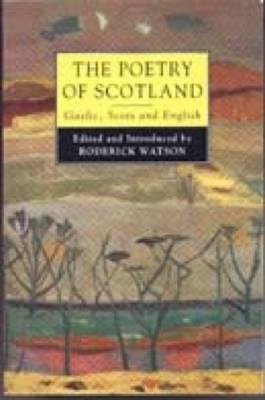A national poetry in three languages is hard to describe, much less anthologize, and, in fact, the situation is even more complex since so much good Scottish poetry was written in Latin, a point made emphatically by Tom Scott in the introduction to his Penguin anthology. Roderick Watson, in editing this wonderful and exasperating volume, has made the wise decision to include the Gaelic (with translations), while at the same time refusing to turn up his nose at the large body of Scottish poetry written in English. (Unfortunately, the decision to omit Latin means the exclusion of Latin poets from Columba to Buchanan.)
Much in this new anthology is quite properly familiar. The Gaelic selections, even in the prosaic translations provided, are not only interesting in themselves but for the light they shed on poetry written in Scots and English. For many English and American readers, it will be their first acquaintance with Sorley MacLean, regarded by many as one of the best Scottish poets of the century. Douglas Young used to say that MacLean was the finest poet writing in Britain, and it would be hard to think of a comparable figure writing in English who can join the purity of MacLean’s lyric with his commitment to the poor.
Across eternity, across its snows
I see my unwritten poems,
I see the spoor of their paws dappling
the untroubled whiteness of the snow:
bristles raging, bloody-tongued,
lean greyhounds and wolves
leaping over the tops of the dykes,
running under the shade of the
trees of the wilderness . . .
Any of us can hear the “Celtic” note in “Dogs and Wolves,” but it is sounded as clearly in his socialist poems like “Calvary,” which I shall quote in a Lallans translation by his friend Douglas Young:
My een are no on Calvary
or the Bethelehm they praise
but on shitten back-lands in
Glesga tounwhaur growan life decays
and a stairheid room in an Embro
[Edinburgh] land [tenement],a chalmer of puirtith [poverty] and
skaith [want],whaur monie a shilpet bairnike
[sick child]gaes smoorit [wallowing] doun til
daith.
In his introduction, Watson confesses that he shares the agenda of “almost all Scottish anthologies and literary histories,” which is to “sustain, imply, construct or seek a version of ourselves through what we have written and what we have read over the years,” and he adds that “It is no coincidence that the first anthology-maps in the self-conscious construction of a Scottish identity were made after the psychic and political trauma of the Union of Parliaments in 1707.” The good sense expressed in such barbarous English marks Watson as the post-modern Scottish professor who cannot apparently distinguish really good poets like Lindsay and Burns, Muir and MacDiarmid, William Soutar and Douglas Dunn from popular dialect writers and such current trend-lickers as Tom Leonard and Liz Lochhead.
But Watson’s very eclecticism and lack of judgment is one of his virtues. The reader may not form the highest opinion of Scottish poetry, but he will have a real sense of the Scottish tradition—its grandeur and power, but also its coarseness and silliness. One of the hallmarks of Scottish civilization is the paradox of great accomplishments and the low critical standards of which MacDiarmid constantly complained, and this warts-and-all anthology will complement more traditional volumes like the Oxford Book of Scottish Verse.
The warts—concretist, feminist, and zen poets—arc undoubtedly annoying, and some of Watson’s choices from famous poets are, quite simply, bizarre. Byron is represented by “When I Roved a Young Highlander” and a passage from The Vision of Judgment; none of Scott’s most famous lyrics is included; and the selection from MacDiarmid is heavily weighted with his English pseudoscientific prosings that will someday figure as largely in his corpus as Wordsworth’s longer philosophizings do in his. Despite all the space given to popular poetry, none is found for Lady Grizzel Bailie or for Montrose, not even the prayer he composed while awaiting execution. Is this reverse snobbery? Robert Garioch’s “Embro to the Ploy”—a satirical masterpiece included by Tom Scott—is absent, and the selection of William Soutar seems calculated to destroy whatever small reputation that poet has outside of Scotland.
The Poetry of Scotland provides lively testimony to the Scottish national tradition, but it also reveals, however unwittingly, the inroads made by a bourgeois modernism, which like Coca-Cola and Levis has displaced the authentic voices of real people. The last important poet whose work is represented, Douglas Dunn, worked as a librarian at Hull, and while his work shares some of the crispness and clarity of Hull’s other librarian-poet, Philip Larkin, his subjects include the grand themes of Scottish verse. In “St Kilda’s Parliament: 1879-1979,” a photographer who took a picture of the men of rugged St. Kilda’s some years before they asked to be removed, returns to the scene to ponder the lives of the inhabitants:
Wise men or simpletons—it is
hard to tell—But in that way
they almost look alikeYou also see how each is
individual,Proud of his shyness and of his
small life,On this outcast of the Hebrides
With his eves full of weather and
seabirds,Fish, and whatever morsel he
grows here.Clear, too, is manhood, and how
each man looksSecure in the love of a woman who
Also knows the wisdom of the sun rising.
Of weather in the eyes like landmarks.
. . . . . . . . .
It is a remote democracy, where men,
In manacles of place, outstare a sea
That rattles back its manacles of salt.
The moody jailer of the wild Atlantic.
This is real poetry, at times reflective and at times direct, and so long as such lines are written, a nation lives in the mind of the poet, much as mankind lives in the mind of God.
[The Poetry of Scotland: Gaelic, Scots and English, edited and introduced by Roderick Watson (Edinburgh University Press) 714 pp.]

Leave a Reply